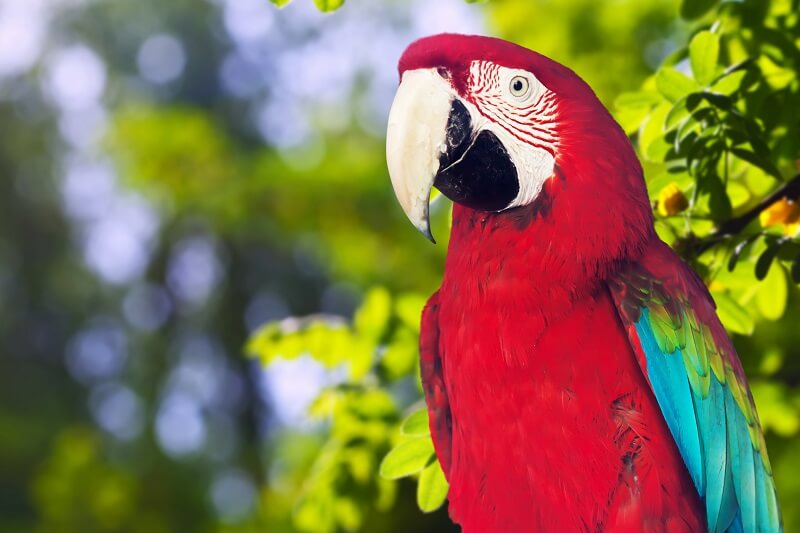Discover the art of optimal parrot care with our comprehensive guide. from balanced diets to expert tips, explore key practices ensuring health.
Introduction
Welcome to the world of responsible and rewarding parrot ownership, where the well-being of these intelligent and social creatures takes center stage. In this chapter, we’ll embark on a brief exploration of the fundamental aspects of parrot care, shedding light on why it’s not just a duty but a delightful journey for pet enthusiasts.
Overview of Parrot Care
Parrots, renowned for their vibrant plumage and captivating personalities, demand more than just casual attention. Proper parrot care is a holistic approach encompassing nutrition, mental stimulation, and regular health check-ups. These birds thrive in environments that cater to their innate need for social interaction and mental engagement.
Understanding the intricate needs of parrots is key to fostering a healthy and fulfilling companionship. As we delve into the specifics in later chapters, keep in mind that each parrot species possesses unique traits and requires tailored care.
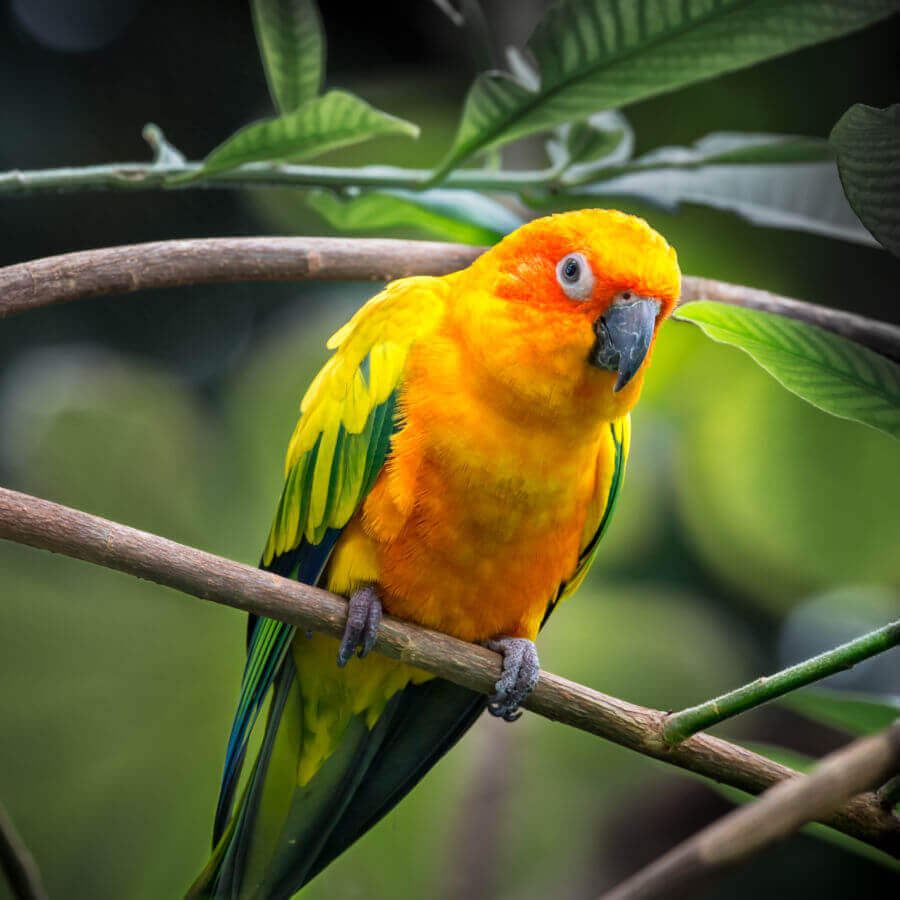
Benefits of Keeping a Parrot
Owning a parrot extends beyond having a pet; it’s a symbiotic relationship enriched with numerous benefits. These feathered companions offer unwavering companionship, bringing joy and a sense of connection to their owners. The bond forged with a parrot is unparalleled, creating a dynamic and interactive relationship that many find incredibly rewarding.
Parrots, with their ability to mimic speech and showcase a range of behaviors, add an element of amusement to daily life. Their adaptability to human routines and affectionate nature make them ideal companions for those seeking a unique and fulfilling pet experience.
Understanding Parrot Species
Welcome to a captivating exploration of the diverse and enchanting world of parrot species. In this chapter, we’ll embark on a journey to understand the distinctive traits and care requirements of some of the most popular parrot species, each contributing its unique charm to the world of avian companionship.
Popular Parrot Species
African Grey Parrot
The African Grey, revered for its exceptional intelligence, is a parrot aficionado’s dream. Known for their ability to mimic speech with astonishing accuracy, these birds demand mental stimulation and a varied diet to thrive.
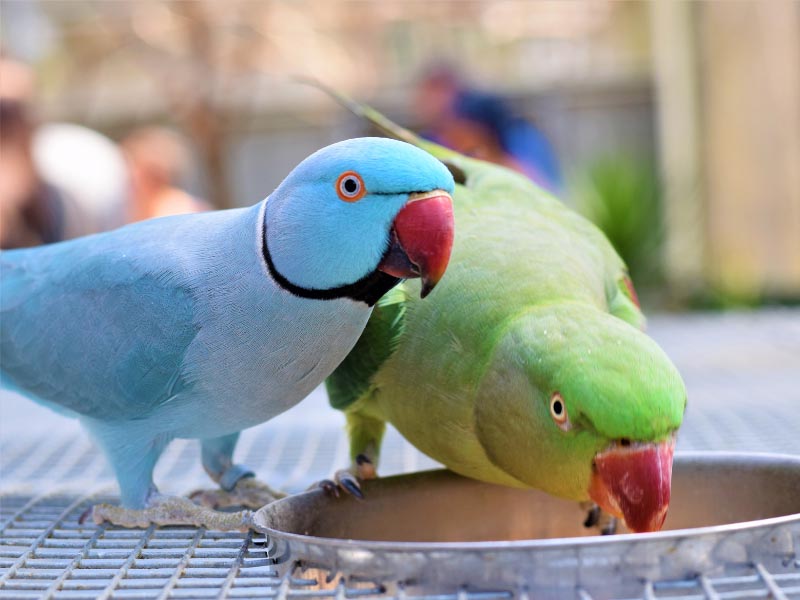
Cockatiel
Cockatiels, with their charming crests and friendly demeanor, make for delightful companions. These smaller parrots are social creatures, and their care involves creating a stimulating environment with ample interaction.
Budgies (Budgerigars)
Budgies, often referred to as parakeets, are popular for their vibrant colors and playful nature. These energetic birds require a balanced diet and engaging toys to keep them mentally active.
Macaw
The majestic Macaw, with its vibrant plumage and large size, commands attention. Macaws are known for their strong social bonds and require spacious environments to accommodate their active lifestyle.
Conjure
Course, characterized by their vibrant plumage and spirited personalities, thrive on social interaction. Their care involves providing opportunities for play and mental engagement.
Individual Species Care Requirements
Understanding the individual care requirements for each species is paramount to ensuring their well-being:
African Grey Parrot Care
- Provide complex puzzles and toys for mental stimulation.
- Offer a diverse diet with nuts, fruits, and vegetables.
Cockatiel Care
- Ensure a social environment with regular interaction.
- Include a balanced diet with seeds, pellets, and fresh produce.
Budgies Care
- Encourage play with toys and provide a varied diet.
- Ensure a well-ventilated cage for their smaller size.
- Provide a balanced and varied diet. This typically includes high-quality pellets, fresh fruits, and vegetables.
- Limit seeds and nuts, as they can be high in fat. They can be given as treats in moderation.
- Ensure access to clean, fresh water at all times.
Macaw Care
- Allow for ample flying space and provide large, sturdy perches.
- Include a diet rich in nuts, seeds, and fresh fruits.
Conjure Care
- Prioritize social interaction and playtime.
- Include a balanced diet with a mix of seeds and fresh foods.
Essential Parrot Care Practices
Welcome to the core of responsible parrot ownership – the essential practices that form the bedrock of a healthy and happy life for your feathered friend. In this chapter, we’ll delve into the critical aspects of parrot care, offering insights into maintaining their well-being and ensuring a fulfilling companionship.
- Nutrition:
- Pellets: Provide high-quality pellets specifically formulated for your parrot’s species.
- Fresh Foods: Offer a variety of fresh fruits and vegetables, such as apples, carrots, leafy greens, and bell peppers.
- Seeds and Nuts: Limit the intake of seeds and nuts, as they are high in fat. Use them as occasional treats.
- Housing:
- Cage Size: Choose a spacious cage that allows your parrot to move, stretch its wings, and climb. The bar spacing should be appropriate for the species.
- Perches: Include different-sized perches to promote foot health and prevent arthritis.
- Toys: Provide a variety of toys to keep your parrot mentally stimulated. Toys that encourage foraging are especially beneficial.
- Social Interaction:
- Time Outside the Cage: Allow your parrot out of its cage for several hours each day for social interaction and exercise.
- Human Interaction: Parrots are social creatures; spend time talking to, playing with, and training their parrot.
- Consider Another Parrot: If possible and suitable for the species, consider getting a companion parrot for social interaction.
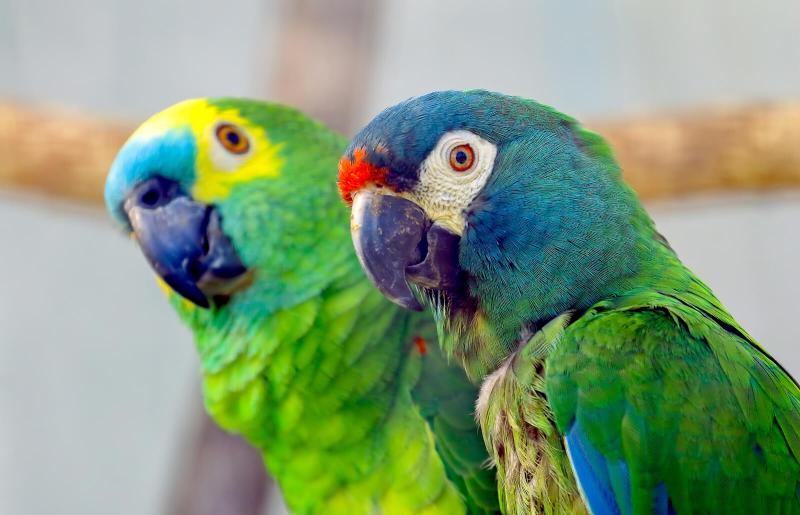
Balanced Diet
A balanced and nutritious diet is the cornerstone of optimal parrot health. Providing a variety of foods ensures your parrot receives the essential nutrients vital for their well-being:
- Seeds: While seeds are a staple, they should not constitute the entire diet. Choose a high-quality seed mix with a variety of seeds to meet different nutritional needs.
- Fresh Fruits and Vegetables: Introduce a colorful array of fruits and vegetables to provide essential vitamins and minerals. Include options like apples, carrots, leafy greens, and berries.
- Healthy Snacks: Offer occasional healthy snacks like nuts, whole grains, and natural treats. These treats should be given in moderation to prevent overindulgence.
Socialization and Stimulation
Parrots are highly social creatures and thrive on interaction. Neglecting their need for companionship can lead to behavioral issues. Here are tips for effective socialization:
- Quality Time: Spend dedicated, quality time with your parrot daily. Engage in activities they enjoy, such as talking, playing, or even simple companionship.
- Toys and Enrichment: Provide a variety of toys to keep your parrot mentally stimulated. Rotate toys regularly to prevent boredom and encourage exploration.
- Environmental Variety: Change the layout of their living space occasionally. This can include rearranging perches or introducing new elements, adding an element of novelty to their environment.
Encouraging Exercise
Physical activity is crucial for a parrot’s overall health. Incorporate exercise routines and play into their daily lives:
- Flight Opportunities: If possible, allow your parrot to engage in supervised flight. This mimics their natural behavior and provides excellent exercise.
- Interactive Play: Engage in interactive play sessions with your parrot using toys, ropes, or other interactive items. This not only promotes physical activity but also strengthens the bond between you and your feathered friend.
Hydration and Cleanliness
Maintaining a clean and hygienic environment is paramount for preventing health issues in parrots:
- Fresh Water: Ensure a constant supply of fresh, clean water. Change the water daily to prevent contamination.
- Cage Cleaning: Regularly clean the cage, removing droppings, uneaten food, and debris. Deep cleaning should be done weekly, addressing all cage components.
Regular Veterinary Check-ups
Regular veterinary check-ups are the proactive approach to ensuring your parrot’s health. Schedule routine visits to an avian specialist for:
- Health Monitoring: Regular check-ups aid in monitoring your parrot’s overall health, catching potential issues early on.
- Preventive Care: Avian specialists can provide guidance on preventive care measures, such as vaccinations and parasite control.
Expert Tips from Avian Specialists
Unlock the secrets of optimal parrot care with insights from seasoned avian specialists. In this chapter, we delve into expert tips that transcend conventional wisdom, offering a deeper understanding of the nuances involved in providing superior care for your feathered companion.
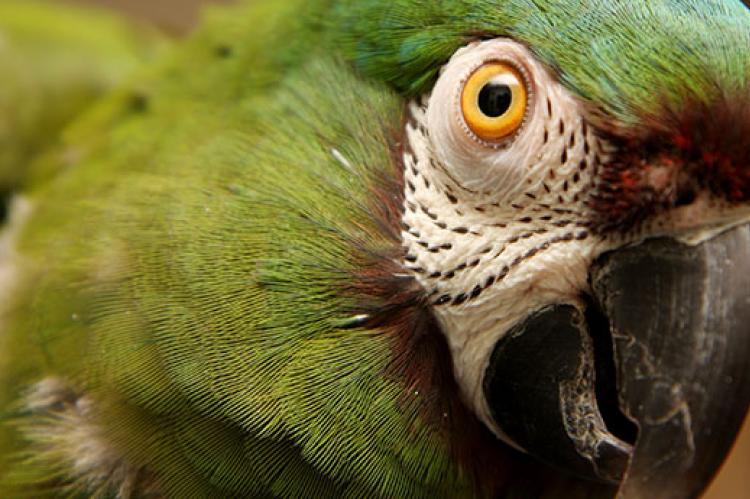
Deep Cleaning of the Cage
Maintaining a pristine living environment for your parrot is paramount to their health and well-being. Avian specialists emphasize the significance of regular deep cleaning:
- Frequency Matters: Deep cleaning should be a weekly ritual, ensuring the removal of accumulated debris, uneaten food, and droppings. This frequency prevents the buildup of harmful bacteria.
- Thorough Disinfection: Avian-safe disinfectants should be used during deep cleaning. Pay special attention to perches, toys, and all cage accessories. A clean cage reduces the risk of infections and keeps your parrot in top condition.
- Inspecting for Wear: Avian specialists recommend a meticulous inspection of the cage components during deep cleaning. Replace worn-out perches or damaged toys promptly to prevent any potential hazards.
Feeding Guidelines
When it comes to the dietary well-being of your parrot, avian specialists offer nuanced insights that go beyond standard feeding practices:
- Tailored Nutrition Plans: Consult with an avian specialist to create a nutrition plan tailored to your parrot’s specific needs. Factors such as age, species, and health conditions play a crucial role in determining dietary requirements.
- Observe and Adjust: Avian specialists stress the importance of keen observation. Monitor your parrot’s eating habits, weight, and overall condition. Adjust their diet accordingly, seeking professional advice when necessary.
- Addressing Common Concerns: From selective eating to obesity, avian specialists provide guidance on addressing common dietary concerns. Understand the nutritional needs of your parrot to ensure a well-rounded and healthy diet.
As you integrate these expert tips into your parrot care regimen, you elevate the standard of care to new heights. Avian specialists bring a wealth of knowledge that can make a significant difference in the life of your feathered companion. Stay attuned to these recommendations, and you’ll be on the path to fostering a robust and thriving relationship with your cherished parrot.
Additional Parrot Care Resources
As we navigate the realm of parrot care, it’s imperative to leverage a wealth of resources beyond the basics. In this chapter, we explore supplementary avenues that enrich your understanding and support your journey toward being an exceptional parrot owner.

Online Resources for Parrot Care
Stay connected with the latest advancements and insights through reputable online platforms dedicated to parrot care. Here are some noteworthy resources:
- Avian Web: A comprehensive hub covering various parrot species, behaviors, and health considerations. Avian Web provides in-depth articles and expert advice.
- Parrot Forums: Engage with a community of experienced parrot enthusiasts. Share anecdotes, seek advice, and participate in discussions that span the spectrum of parrot care.
- Petch: Offering a dedicated section to parrot care, Petch provides a range of articles, tips, and interactive features to enhance your parrot parenting skills.
- YouTube Channels: Visual learners can explore YouTube for channels like ‘Bird Tricks’ and ‘Marlene Mc’Cohen.’ These channels feature educational videos on training, enrichment, and health care.
Local Parrot Care Services
When seeking local support, consider the following avenues for reliable parrot care services:
- Veterinary Clinics: Establish a connection with avian-savvy veterinarians in your locality. Regular check-ups and immediate attention to health concerns are crucial aspects of responsible parrot ownership.
- Avian Specialists: Look for specialists who focus exclusively on avian care. Their expertise ensures tailored solutions for your parrot’s specific needs.
- Pet Stores with Avian Experts: Some pet stores employ staff with specialized knowledge in avian care. Establishing a relationship with these experts can provide ongoing assistance.
As you explore these additional resources, remember that the journey of parrot care is dynamic and requires continuous learning. Harness the collective wisdom available online and in your local community to create an environment where your parrot not only survives but thrives.
FAQs on Parrot Care
In the world of parrot care, questions abound, and it’s crucial to address them with clarity and expertise. This chapter is dedicated to unraveling the Frequently Asked Questions (FAQs) surrounding parrot care, providing nuanced insights into common concerns that every parrot owner may encounter.
Why is my parrot plucking its feathers, and how can I stop it?
Feather plucking is a multifaceted issue that may stem from various causes, including stress, boredom, or health issues. To address this, consider:
- Enriching their environment with toys and stimulating activities.
- Consult a vet to rule out underlying health problems.
- Maintaining a consistent daily routine to reduce stress.
What should I do if my parrot refuses to eat certain foods?
Dietary preferences can be challenging, but ensuring a balanced diet is paramount. Try:
- Introducing new foods gradually to acclimate your parrot.
- Experimenting with different textures and presentations.
- Consult a vet for specialized nutritional advice.
How can I train my parrot to talk?
While not all parrots talk, training can enhance their vocal abilities. Consider these tips:
- Consistent Repetition: Repeat words or phrases regularly.
- Positive Reinforcement: Reward attempts with treats or praise.
- Social Interaction: Engage in regular conversations to stimulate learning.
Is it normal for my parrot to scream, and how can I manage it?
Parrots vocalize for various reasons, but excessive screaming can be managed:
- Identify Triggers: Understand what prompts the screaming.
- Positive Reinforcement: Reward calm behavior.
- Create a Quiet Zone: Provide a designated space for quiet time.
How often should I take my parrot to the vet, and what signs indicate a health concern?
Regular vet check-ups are crucial, and signs of health concerns include:
- Changes in eating or drinking habits.
- Altered behavior or sudden aggression.
- Abnormalities in droppings or physical appearance.
What are the signs of a happy and content parrot?
A content parrot exhibits:
- Playful behavior and exploration.
- Healthy feather condition.
- Positive interactions with the owner and environment.
Navigating the intricacies of parrot care is an ongoing process. By addressing these FAQs, you’ll be better equipped to foster a happy, healthy, and harmonious relationship with your feathered companion.
Conclusion
As we navigate the diverse realm of parrot care, it becomes evident that these intelligent and social beings require thoughtful attention and commitment from their human companions. The journey through this guide has unveiled a spectrum of insights, from the fundamentals of balanced nutrition to the intricacies of addressing FAQs.
A Tapestry of Responsibility
Caring for a parrot is not merely a routine; it’s a commitment woven with threads of responsibility. The relationship between a parrot and its owner is a delicate tapestry that thrives on understanding, patience, and dedication. By comprehending the unique needs of each parrot species and implementing tailored care practices, we contribute to the well-being of our feathered friends.
Harmonizing Nutrition and Well-being
The emphasis on a balanced diet serves as a cornerstone for parrot care. It’s not just about sustenance; it’s a melody of flavors and nutrients that orchestrate their health and vitality. From seeds to fruits, and vegetables to healthy snacks, every element harmonizes to compose a symphony of nutrition crucial for a parrot’s flourishing life.
A Clean Canvas: The Cage
The avian specialists’ insights on cage maintenance offer a brushstroke of wisdom in the canvas of parrot care. Regular deep cleaning is not a mundane task but an art that ensures a hygienic living space, fostering an environment where health can thrive, and your parrot can spread its wings freely.
The vast sea of online and local resources beckons every parrot enthusiast. From reputable websites and blogs to local vet clinics and avian specialists, this chapter serves as a compass, guiding you to navigate the sea of information and find the resources that best align with your parrot care philosophy.
Unraveling the FAQs
In the pursuit of comprehensive parrot care, this guide has unraveled the frequently asked questions, addressing concerns that resonate with every parrot owner. From feather plucking to speech training, the FAQs section is a beacon of knowledge, offering insights that illuminate the path to a harmonious relationship with your parrot.
The Final Note
As we conclude this guide, let the summary of key takeaways resonate as the final note in our symphony of parrot care. Embrace the joy, companionship, and responsibility that come with having a parrot as a pet. May your journey in parrot care be filled with enriching experiences, and may you continue to learn, adapt, and thrive alongside your feathered companion?
